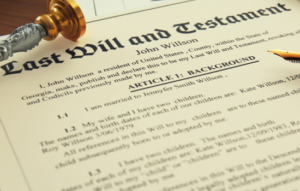
Through the years, I have heard several sermons on the parable of the Rich Fool found in Luke 12:13-21. Most of these sermons emphasize the importance of not storing treasure on earth and neglecting your riches towards God. What gets me thinking is the first part of this passage. A person in the crowd Jesus was teaching asked Jesus to make his brother divide the inheritance with him. He answers him with a question, “Who made me a judge or a divider over you?” and then goes on to warn them about covetousness and the parable of the rich fool.
Looking at this through our American eyes, we most likely would say it should be divided between the two because that is what is fair. But since we have no context and what little information we have, a guess as to which brother was doing the asking and what the circumstances were for it not being split in the first place would be all we could manage. But the ask is what leads me to the central issue of this post.
For many of us, we operate on the preset position of being fair to all of our children and not weighing out the repercussions of that fairness. We work and build wealth for the future, and many hope to pass that wealth on to our families. Sometimes without calculating the cost of that inheritance to the loved ones, we are passing it on to. Or worse, not making any plans and expecting our kids and heirs to work it all out for themselves. Both situations can lead to severe family issues and drive a wedge between the loved ones you are leaving behind.
An inheritance is a wonderful thing to leave your family and should be something we strive to do, but it isn’t as simple as, “When I die, just divide up what is left amongst yourselves and go on.” Besides all the legal requirements of liquidating an estate, a huge emotional cost also needs to be calculated in the process. For example, let’s say you have three children and five grandchildren once your estate needs to be divided. With no plan in place, the estate goes to the children first and then grandchildren after being divided equally. But let’s say that one of your three children has 4 of the grandkids, one has one, and the other has none. With no Will or plan in place, the estate is split equally between the three. The grandkids will not factor into the equation at all. So if you desired to leave something to the grands, it would be up to the siblings to choose on their own. This pulls me back to the man in Luke 12; we don’t know the situation. What if it was that the man asking was the son with the four grandkids? This doesn’t change the message of not being covetous, but we are also told in Colossians 3:21 not to provoke our children so they become discouraged.
Calculate the future effect your inheritance will be on your family. Do you know how you would want it to be dispersed? Please put it in a Will and talk about it with your family so that everyone is clear on your wishes. If you don’t want it split equally for whatever reason, discuss those reasons with all the parties it pertains to and place the instructions in a Will. Write letters to your heirs explaining your decisions and include those in the Will. Understand that while our choices will make perfect sense to us, others may see them as, “Well, I wasn’t the favorite,” “I wasn’t loved as much,” or “My siblings must have talked them into this.” We don’t want a wedge driven between our family after we have gone on, especially over something as insignificant as a misunderstanding of our intentions.
Last, even if you don’t believe you will leave a large enough inheritance to affect anyone, please understand that it will affect our loved ones. Our job is to teach our children the proper view of material possessions and to build their treasure in God. But also understand that we live in a world that will require us to leave things behind, which those kids will have to deal with and, often, they will equate our feelings for them with the items left behind.

